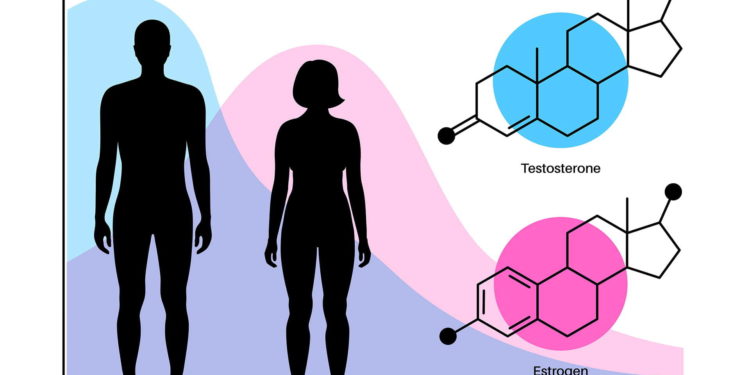Hormonal imbalance is like a disruptor in the proper and healthier routine of your body, causing some disturbing issues that are not normal. The delicate balance of your body is important and it does get disrupted by hormonal imbalance.
Nonetheless, it does exist and disrupts health, affecting key body functions and vital chemical signals. Acceptance is the key to hormonal imbalances signs because people think hormones are unnecessarily hyped, which they certainly are not because when they start playing games, your mental, physical, and psychological health are horribly disturbed.
A lot of times this happens, a kind of disturbance you feel but can’t figure out what is going on. It can be like some digestive issues, sleep problems, tiredness, or even obvious signs like acne, or hair issues.
Amidst all this, your hormones can be playing games that are not so good for your body. Hormonal imbalances signs speak in the form of health or body function disturbance and all you need is to truly figure it out.
Hormonal imbalance interferes with the precisely timed chemical messages that coordinate your health and essential bodily processes. If important processes and essential chemical signals in the body are affected, it compromises the health of the body.
By serving as messengers, hormones play a vital part in regulating biological processes. They communicate with organs, tissues, and cells to provide them instructions on when to carry out particular functions.
Hormones direct a work of physiological processes, ensuring that everything proceeds smoothly and in unison.
What Are Hormones And Hormonal Imbalance?
Hormones are chemical messengers made by the glands in your body. By giving instructions to organs and tissues, they control many activities, including metabolism and mood. So, when one hormone is present in either an excessive or insufficient amount, there is a hormonal imbalance. Even little changes can cause body malfunctions, which can result in a number of health problems.
It is this simple to understand but what it does to the body is a lot complex.
Think of your brain as a super-smart center that gives messages to the body. Certainly, it is the one in charge, of deciding what is best for your body. Hormones are a team of messengers that the brain uses; it does not carry out this function alone.
Hormonal imbalance starts by interrupting some functions of the body and showing hormonal imbalances signs.
Now, there is a hormone unit, located deep within the body, where hormones are produced.
Hormones are produced and then start the journey through the bloodstream, sending fundamental messages to various body parts.
As your body is full of organs like the stomach, the muscles, and the heart, they function, and the hormone works in each. There are several recommendations on how to digest food, build muscle, do important cycles, and even feel happy.
But here an important thing is that the hormones must be perfectly balanced because the body just doesn’t work right with Hormonal imbalance if you have too much or too little of a hormone!
Hormonal imbalance is like having too much salt in your soup.
Since hormones are the messengers of the body, if they become confused or malfunction, there would be a chain of unnecessary events. These imbalances can disrupt your harmony of body and cause everything from mood swings and energy dumps to skin problems and weight fluctuations, which can have an effect on your general well-being.
Hormones are essential for controlling a number of bodily processes. These chemical messengers, which are made by many glands, are in charge of keeping body processes in harmony and balance.
However, when the delicate hormonal balance is upset, it can have a significant impact on a person’s health and general well-being.
Symptoms Of Hormonal imbalance
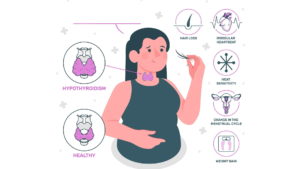
Symptoms of hormonal imbalances include
- Fatigue
- Mood changes
- Loss or increase in weight
- Hair fall
- Acne
- Intestinal problems
- Insomnia
- Changes in Weight
- Some individuals get a hump of fat between their shoulders
- Weakness, pain, tenderness, and stiffness of the muscles
- Joint issues
- Your heart rate may change suddenly, either rising or falling.
- Sweating
- Increased sensitivity to hot or cold temperatures (temperature sensitivity)
- Constipation or more frequent bowel movements
- Urinary Changes
- Changes in Appetite
- Emotional symptoms from Hormonal imbalance can include irritation, anxiousness, anxiety, or depression.
- Difficult for women to conceive
- Headaches
- Weak Bones
- Vision Problems
- Infertility can be a symptom of hormonal imbalance in cases of reproductive issues
- Changes to the skin and hair are possible, including puffy or rounder faces, dry skin, brittle hair, and thinning hair.
- Stretch Marks
Furthermore, the specific hormones and glands involved can have a big impact on how these symptoms are visible. It’s fundamental to see a doctor for a complete assessment and diagnosis if you have severe or stubborn symptoms.
Since the anatomy of men and women is different, let us see how hormonal imbalance is different,
In men and women, hormonal imbalances can present differently, mostly depending on the particular glands and hormones impacted. Some of the body functions in men and women are different like reproductive health. This makes some exceptions like a woman gives birth and has several biological processes going on. On the other hand, men’s emotional and physical health differs.
Hormonal Imbalance In Woman
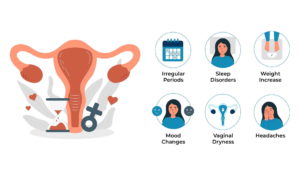
Hormonal imbalance female symptoms manifest as a variety of symptoms
- Mood swings can harm emotional health
- Constipation or diarrhea
- Effect on fertility
- Back or abdominal discomfort
- Insomnia or altered sleep habits.
- Unexplained weight gain or decrease.
- Bones become more brittle, which raises the risk of fractures.
- Overgrowth of Hair
- Rashes on the skin
Hormonal Imbalance In Man

Males, who have hormonal unevenness, mainly those caused by low testosterone levels, can experience the following signs and symptoms:
- Loss of muscular Mass
- Hair thinning and impaired hair growth
- Discomfort or soreness in the chest region may occur.
- Mood Changes, irritation, despair, or anxiety as a result of Hormonal imbalance
- Rise in body fat, especially in the abdominal area
- Memory and Cognitive Issues
- Sleep disturbances, or insomnia
- Osteoporosis (severe bone density loss)
- Cardiovascular Problems
Important Hormones And Their Function In Body
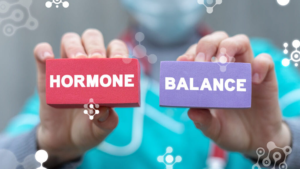
The chemical messengers of the body, hormones each have a specific role in regulating a variety of biological functions. Therefore, hormonal imbalances signs are quite visible. They have great importance in the overall health and stability of the body.
Testosterone and estrogen: These are the basic gender hormones. Estrogen is essential for the growth of sexual characteristics of women, for controlling the menstrual cycle, and for maintaining bone health. Male sexual features, muscle mass, and general vitality are all influenced by testosterone, which is found in both males and females but is more prevalent in males. Therefore, hormonal imbalance in woman and Hormonal imbalance in man would be quite visible in this case.
Insulin: The pancreas produces insulin which is important for controlling blood sugar (glucose) levels. It allows the uptake of glucose by cells from the bloodstream, giving them energy and preserving steady blood sugar levels.
Thyroxine (T4) and triiodothyronine (T3): They are thyroid hormones produced by the thyroid gland and are essential for controlling metabolism. They have an impact on energy generation, body temperature, and heart rate, which affects metabolism as a whole. Thus Hormonal imbalance would be a lot disturbing.
Cortisol: Also referred to as the stress hormone, cortisol helps in blood pressure regulation and the body’s response to stress. Additionally, it affects how the immune system and metabolism are regulated. Hormonal imbalances signs here can cause stressful consequences.
Adrenaline: Also known as epinephrine, it is produced by the adrenal glands. It causes a sudden rise in energy and heart rate, getting the body ready for a physical response to stress or danger.
Melatonin: It controls the sleep-wake cycle and is produced by the pineal gland. It helps in keeping a regular sleep pattern by serving as a signal for when to sleep and when to wake up. That is why hormonal imbalance can disturb sleep.
Progesterone: Together with estrogen, progesterone helps to sustain pregnancy and regulate the menstrual cycle. It helps to maintain pregnancy by preparing the uterus for a fertilized egg. Hormonal imbalance can halt fertility.
Growth hormone (GH): Produced by the pituitary gland, Growth hormone promotes bone and tissue development as well as growth, particularly in children and adolescents.
Prolactin: This hormone, which is also produced by the pituitary gland, stimulates pregnant and nursing women to produce more breast milk.
Causes Of Hormonal imbalance
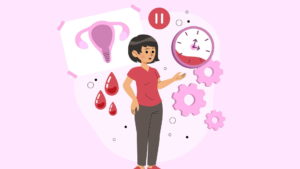
The following are the causes of disturbed hormones in the body
Missing Meals: Skipping breakfast or lunch might have a negative impact on your health and hormonal balance.
Excessive Exercise: Hormonal imbalances can also be caused by too much exercise
Lack of Sleep: Sleeping insufficiently (6 to 7 hours) can upset the balance of your hormones.
Excessive Screen Time: Hormones can be impacted by excessive screen time, particularly right before night. It’s a good idea to set screen time restrictions.
Endocrine Disorders: Diseases like diabetes, thyroid issues, and polycystic ovarian syndrome (PCOS) can interfere with the normal functioning of the endocrine system.
Chronic stress: It can cause the body to produce too much of the stress chemicals cortisol and adrenaline, which can have an impact on other hormonal systems, and thus hormonal imbalances signs can appear.
Diet and nutrition: Hormone production and regulation can be impacted by poor eating habits and nutritional deficits, hence causing Hormonal imbalance.
Medication: Some drugs, such as corticosteroids and birth control pills, might cause Hormonal imbalance.
Age: Hormone levels fluctuate naturally as we become older, as seen in menopause in males and menopause in women.
What Is The Relationship Between Hormonal Imbalance And Mental Health?
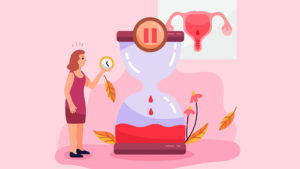
Well, hormones can really trigger your emotional and mental health if they are misbalancing.
It is important and complicated that hormone imbalance and mental health are related. Hormones are essential for controlling mood, emotions, and general mental health.
The main regulators of mood, emotions, and general mental health are hormones. Hormonal imbalances can cause mood swings, like progesterone and estrogen that happen during menstrual cycles, pregnancy, perimenopause, and menopause. Hormonal imbalances, which go beyond mood swings, can increase the risk of mood disorders including sadness and anxiety.
Post-delivery depression is one such condition that is brought on by hormonal changes following childbirth. Hormonal changes, such as those associated with premenstrual syndrome (PMS), can also cause irritability and agitation. Additionally, hormonal abnormalities, particularly those involving the thyroid, have the potential to affect cognitive function, with hypothyroidism being associated with memory loss and attention issues.
Not everyone who has hormone irregularities will develop mental health problems as a result. Additionally, there is a reciprocal relationship between hormone levels and mental health; problems with mental health can affect hormone levels in the other direction.
Persons showing severe mental health symptoms linked to hormone abnormalities must get medical care from a mental health expert. Hormone therapy, counseling, lifestyle changes, or a mix of methods can be used as treatment options to address the problem’s hormonal and psychological components.
As body types are different, the hormonal impact is also different. Some people go through extreme hormonal disturbance and some do not.
However, it is always important to consider and accept the signs that the body is showing of Hormonal imbalance.


